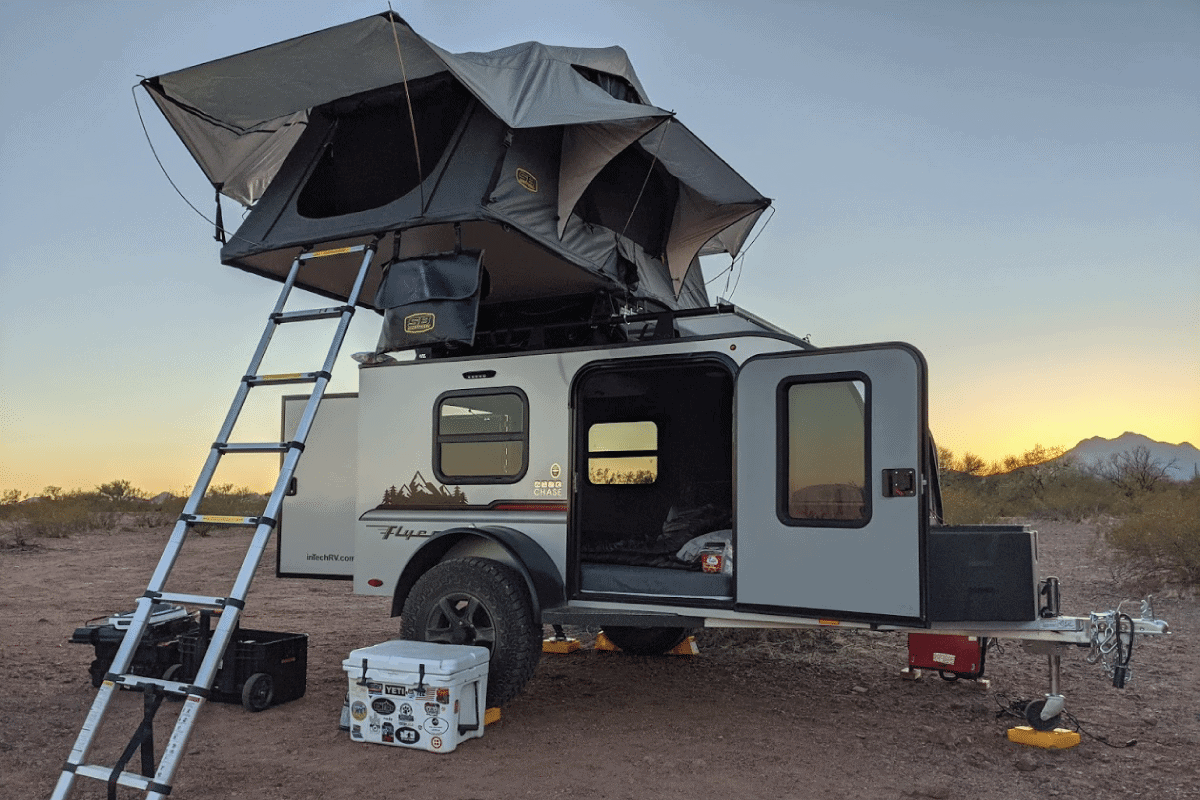If you’re tired of setting up a ground tent or want something that keeps you off the dirt and away from critters, a rooftop tent might seem like a solid upgrade.
But is it actually worth it?
We’ve been using one for a while, and while we love it, a rooftop tent isn’t the right choice for everyone. If you’re debating whether to invest in one, here’s what we’ve learned and what to consider before buying.
Rooftop Tent vs. Ground Tent: What’s the Difference?
The biggest difference is where you sleep. A rooftop tent mounts to the top of a vehicle or trailer, while a ground tent stays, well, on the ground.
Rooftop Tent Advantages:
- Keeps you off the dirt, away from bugs and critters
- Faster setup once mounted
- No need to find level, debris-free ground
- Can store bedding inside when folded up
Ground Tent Advantages:
- More affordable and widely available
- Can be set up anywhere, not just on a vehicle or trailer
- No added weight or height restrictions
- More interior space and headroom
Which one is better? That depends on your budget, camping style, and whether you’re willing to deal with the quirks of a rooftop tent.

Why We Chose a Rooftop Tent
We Found One That Fit Our Budget
Rooftop tents can get expensive, but not all of them cost $3,000. We went with the Smittybilt Gen2 Overlander for around $1,300.
Looking at it as a long-term investment, we figured if the tent lasts ten years and we camp at least ten times a year, that’s about $13 per trip. For us, that was worth it.
It Lets Us Set Up a Basecamp
We prefer to establish a basecamp and explore from there.
Since our rooftop tent is mounted on our trailer instead of our Jeep, it means:
- We can leave camp without losing our spot.
- We don’t have to fold up the tent every time we want to drive somewhere.
- It gives us a secure place to store food away from wildlife.
If your rooftop tent is mounted on your vehicle instead of a trailer, be ready to pack it up every time you move. That’s a dealbreaker for some campers.
It Keeps Us Off the Ground
Camping in the desert means there’s a lot of stuff on the ground that stings, bites, or crawls into places it shouldn’t.
Sleeping off the ground means fewer chances of waking up next to a rattlesnake, scorpion, or tarantula. It also keeps us away from ants, spiders, and whatever else roams around at night.
It Gives Us Separate Sleeping Spaces
One of us snores, the other is a light sleeper. Separate sleeping setups keep everyone happy.
We also like having the option to bring a guest camping without cramming everyone into a single tent.
We Use It as a Mini Hotel for Guests
Since we live full-time in a 39-foot motorhome, space is limited. When guests visit, they usually have to book a hotel or rent a park model, which isn’t cheap.
Now, we can rent the campsite next to us and give guests a private space to stay in our trailer and rooftop tent instead.

Things to Consider Before Buying a Rooftop Tent
Cost vs. Value
Rooftop tents are more expensive than a ground tent, so you have to decide if the benefits outweigh the cost.
If you only camp a couple of times a year, it might not be worth it. But if you camp often and want a faster setup, it could be a solid investment.
Setup and Teardown
Rooftop tents set up quickly once they’re mounted, but they’re not as instant as some people think.
- You have to unzip the cover, unfold the tent, and set up the ladder.
- If it’s cold or wet, expect condensation inside the tent.
- If it’s mounted on your vehicle, you have to pack it up every time you drive somewhere.
Weight and Vehicle Compatibility
Not every car or SUV can handle the added weight and height.
Before buying, check your roof rack weight limit and whether your vehicle’s suspension can handle it. If you have a smaller vehicle, a ground tent or trailer-mounted option might make more sense.
Weather Protection
A good rooftop tent keeps rain and wind out, but high winds can still make for a rough night.
- They stay warmer in the cold since you’re off the ground.
- They can get hotter in summer without airflow underneath.
- They handle wet weather well but should be fully dried before storage to avoid mildew.
Would We Buy a Rooftop Tent Again?

Yes, but only because of how we camp.
For us, the basecamp setup, security, and separate sleeping spaces make it a good fit. But if we camped less often or didn’t have a trailer, we might have stuck with a ground tent.
If you’re thinking about buying one, consider how you camp, what your budget is, and whether the benefits outweigh the downsides.
For some people, a rooftop tent is a huge upgrade. For others, a simple ground tent works just fine. The best tent is the one that actually gets you outside.
Still Here? You Must Be the Human Equivalent of Well-Seasoned Cast Iron Pan.
Most people tap out early like tourists who underestimate Arizona heat. But not you. You’re built different. So why not pull up a camping chair with us on Substack?







